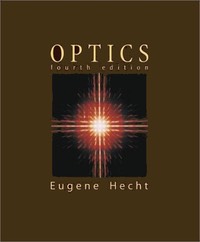Course Objectives
There are several specific objectives to this course, as well as more general goals relevant to your physics curriculum:
- Increase your fundamental knowledge of optics: geometric, physical, and modern.
- Understand the relevance of optics to other fields of physics and science and its role in many technologies.
- Apply the principles of optics in laboratory situations.
- Effectively define problems and communicate their solutions.
- Improve your mathematical abilities.
Course Structure
Technically, there are three 50-minute lectures scheduled per week. You should expect some flexibility to this; although there is no structured lab period each week, there will be instances when we will need to trade lecture time for lab time. It will not be possible to adequately cover this material without experimental support. You will need to spend unsupervised time in the lab, and you will be expected to manage your time accordingly.
Course Information
Everything you need to know, plus at least a few things you didn’t know you needed to know will be found here on this course web. You should bookmark it, and make a habit of regularly checking it.
You should come to class prepared, especially if that means knowing not to come to class on Monday because we are doubling up for a lab on Wednesday. Or maybe it means knowing that you need to have that problem set finished up to hand in on time. At the very least, it will mean having the appropriate tools.
It will also mean spending sufficient time out of class: reading the book, solving problems, discussing optics animatedly with all your classmates, texting optics jokes to your best pals. Seriously. Two (or three) hours for every hour of class time.
Exams and Quizzes
There will be three in class exams (100 points each). Dates on calendar. The final exam will be cumulative, and worth 20% of your course grade. Quizzes will be given at random intervals, for ten points each. All exams and quizzes will require math skills.
Math Skills
You need these, but you cannot rely on me to teach you math. Especially
- Algebra: We have absolutely zero time to spend reviewing basic skills.
- Trigonometry: Basic definitions and identities. Whatever you don’t have memorized, you need to know where to look up.
- Vectors: Thinking in three dimensions is non-negotiable. So is being able to dot and cross products quickly/accurately.
- Calculus: If you cannot differentiate and integrate fluently, this is not the course for you. There will be calculus.
Whatever tools you are using (slide rule, calculator, Maple), you are responsible for your own proficiency. You will only be allowed to use a calculator during exams.
Problem Solving
You will have to solve problems. I tell you three times, and what I tell you three times is true: you have to solve problems. Lots of them. You should expect to solve the assigned problems, and submit homework sets. There will be ten assignments worth 20 points each.
You should also expect to solve additional problems, you know, just for fun and practice. If this is not your idea of a good time, you may want to reconsider your choice of major. I hear business majors have a lot of free time.
Homework problems must be set up neatly and completely. You should work on either green engineering paper or blank, unruled paper. Notebook paper is not really acceptable, and regular graph paper is not a good choice either. Your homework submission should include a neat sketch (use a ruler for straight lines), completely and clearly labeled. The problem must be set up symbolically using the same set of variables as you labeled on your sketch. You must include enough mathematical detail to demonstrate that you have actually solved the problem. Finally, the numeric answer should be clearly visible, accurately labeled, and include the appropriate units. If necessary, I will invoke point penalties for neatness and/or format problems.
Homework must be submitted at the beginning of the lecture period when it is due. No homework papers will be accepted at the end of the period, and no late homework will be accepted for any reason. Problem sets will be generally be due on Mondays. Always check the course calendar to be certain of specific assignments and due dates.
Lab Reports
There will be several laboratory exercises to complete over the course of the semester. You will be responsible for completing the experiments within the time provided. Formal lab reports are required for each of the experiments (100 points each).
Personal Electronic Devices
Cell phone use is strictly prohibited during lecture and lab time. You are not permitted to use either a cell phone or a PDA as a calculator during labs, quizzes, or exams. You must turn your phone, pager, and PDA off for the duration of class time. This does not mean switch silent ring; it means off. If your cell phone rings during an exam, you will be required to turn in your exam and leave the room immediately. You will not be allowed to complete your call, then return to taking your test. In the event that cell usage becomes problematic, I reserve the right to implement point penalties for repeat offenders. The number of points per penalty is left to my discretion. No exceptions to this policy will be made for any reason whatsoever.
Disclaimer
Assignments, point distributions, grading scales, and course policies should be regarded as flexible and subject to substitution or change at the discretion of the instructor. Please refer to the 2007–2008 Student Handbook for additional university policies. The University of Central Arkansas adheres to the requirements of the Americans with Disabilities Act. If you need an accommodation under this act due to a disability, contact the UCA Office of Disability Services at 501.450.3135.
